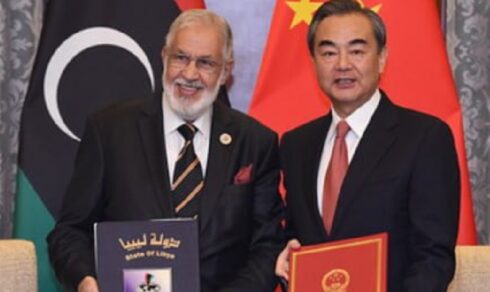Written by Damir Nazarov
While Zionism continues its genocide in the Gaza Strip and southern Lebanon, and tries to threaten Iran, Iraq and Yemen, its other enemy is gradually expanding its influence. This is Turkish diplomacy, which, in conjunction with China, has once again shone, this time in Libya.
At the end of November, Turkish Foreign Minister Hakan Fidan announced that his country had opened a consulate general in Benghazi, and that representatives of the business elite of Eastern Libya were becoming frequent guests of the Turkish Republic. Two months before this sensational statement, the Chinese announced a “strategic partnership” with Libya. The unexpected Turkish-Chinese activity in the Libyan direction completely changed the political situation. For almost ten years, the Turks were the main support of the “government of national accord” in the west of Libya, which made them the main opponent of the military junta named after Khalifa Haftar in the east of the country. However, now Turkish businesses are calmly entering Benghazi and meetings with the Haftar administration are held on a regular basis.
Ultimately, the Turks voiced their goals at a meeting with a military delegation from Libya: “Our ultimate goal is a united Libya, acting together with all its institutions.” Behind the Turkish desire for “unity in Libya” is hidden a Chinese plan for de-escalation within the Arab Republic and the beginning of a process of political stabilization. In this context, the statements of the Deputy Ambassador of China to the UN about the need for an early withdrawal of foreign armed forces and mercenaries from Libya should be seen as a warning to all regional (UAE, Egypt, Zionists) and world players (Russia, France, USA).
The Chinese warning concerns, first of all, representatives of the Wagner PMC, Salafis-Madkhalis loyal to the UAE, Arab-African mercenaries from Sudan and Chad for Haftar. But does this apply to the Syrians and Turks who are in alliance with the militias of western Libya? Let’s start with the fact that the Turkmen community lives in Libya, which from the point of view of the state ideology of Turkey automatically makes them “one with the historical homeland”. Therefore, the very fact of the Turkmen living in Libya means the legal presence of their “Turkish relatives” in the places of residence of the community. As for the Syrians, some of them will be returned to their homeland, but some will remain, since they are employees of the SADAT PMC, which makes them a legal force in the context of the Chinese call, because there is a strategic alliance between Turkey and China.
China continues to work effectively to stabilize the Middle East region, thereby expanding the Silk Road project, where Turkey plays a key role. One of the most significant successes of Beijing’s diplomacy was the order in relations between Saudi Arabia and Iran, and now the Celestial Empire is launching a process of reconciliation in old hot spots, be it Libya, Somalia, Syria and Yemen.
MORE ON THE TOPIC:







if china and turkey are partners that means that either turkey backstabbed china as well in syria by using chinese uygur fighters in its offensive against assed or china is in on it which means that china sees turkey as the protector of its silk road and not russia and iran. by the way ghadaffi made a deal with china instead of the eu or russia as well. the eu with us help killed him and the russians looked grinning the other way while china did nothing.
they dont like players who want to be independent of their financial control..
nonsense. china will not have any influence as long as it refuses to defend it’s interests with military.
you don’t even understand who china is. you think the news tells you the truth you’re naive.
perché la russia si interessa dei paesi del golfo tutte le guerre nascono lì, l’africa è grande si può posizionare il altri posti, poi il corridoio india iran russia è molto vantaggioso , dire addio a medioriente è un vantaggio secco, la turchia ha preso molti paesi a influenza russa basta imbrigliare di brutto deve rientrare in turchia ormai non è più utile alla nato.
congrats to the prc… now where is there help extracting turkish, i$raeli and americunt($) in daraa and damascus for all of that cheap russian oil and gas they are receiving as the silent “$ilent” partner?!!!…
wake up .the jesuits entered china in the early 1600s .read your history then think.
here’s some. matrilineal dynasties part 3. you tube use your deduction. wake up
understand george 111 wasn’t catholic imagine his power if he had kept america? use your flippin brains.
europe’s hidden matrilineal dynasty | house of garsenda
1,122,557 views · there’s your vanguard you can bet and their siblings abd their heirs ars ruling the corporate world today right now imo intermarried interracialy inter religiously internationally. wake up.
matrilineal dynasties part two. eleanor of aquitane & euphrosyne… you tube
join the dots count the catholics, count the number of holy roman emperors. wake up.
then just go and look at all of them rejoicing over the socialised reconstruction of our lady in paris regardless that they aren’t even supposed to be catholics. wake up.
“good man, this one” trump meets with prince william after notre adame cathedral… ” you tube
wills grandmother was devout catholic diana’s mummy. trumps scots ancestry would be mixed but a lot of catholic imo. anyway” all their plans will come to nought ” john.
wills who said to harry,” just play the game, that’s what i do “.
and here’s his friend s inquest, thomas kingston widow issues warning in tragic statement at… you tube
i’m not satisfied that it was the adverse reaction alone.
remeber they had the royal dr’s put diana on antidepressants immediately after the private wedding celebration the next day, according to unauthorised biographies.